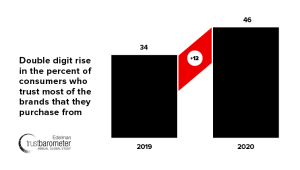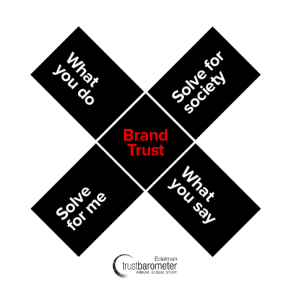Trust is fundamental for startup founders. Here’s how to build it.
Successful brands are built on trust. This makes it critical to think about the foundations of trust from day one – no matter your sector or size. With our work at 5&Vine spanning pre-seed to Series B startups, and everything from organic meal delivery to disease outbreak risk software, we know what it takes to build trust.
But how exactly does your brand go about doing that, and are you doing enough?
Trust Starts Internally
Back in 2003, an article was published in Harvard Business Review titled The Enemies of Trust. Within it, the writers break down internal trust within an organization into three categories:

The article describes these types of trust as ‘distinct’, and goes on to explain how critical the building of trust is for the success of a business.
Reflecting on it almost two decades later, particularly in the business, political, and media climate we’re currently living in, it’s something that still rings true. For a startup to succeed today, trust needs to be built into its framework and foundations, and felt by employees, managers, and the very brand itself.
Showcase Trust To Others
After it launched, sleep retailer Casper introduced a 100 night risk-free, no-strings attached trial for its mattresses and a 30 night trial on all other Casper products. It was a bold move for the brand. By offering customers three months of free testing with the confidence they wouldn’t send it back, Casper managed to showcase the trust they’d built internally to others.
Trust is also developed through acknowledgement. There’s a chance, as a brand, things don’t go to plan, and there’s a lot of value in admitting you’re wrong. Following a chaotic period of Playstation 5 pre-orders, the brand tweeted an apology. It was short but at least acknowledged what so many were feeling frustrated about.
Third-party validation is another way to showcase trust. Most brands, including ours, will feature logos from trusted brands we’ve worked with, complete with testimonials and case studies. Showcase who believes in your brand, and don’t be afraid to tell them why.
Listen To Feedback
Feedback shapes trust, and should be considered a gift. As a brand there can be a tendency to dismiss critical feedback from customers, partners and investors. And while you don’t need to take all feedback on board, you do need to listen to it, acknowledge it, and consider how it should be responded to.
It’s for this reason customer support is so critical to an organization. According to American Express, 90% of Americans use customer service as a factor in deciding whether or not to do business with a company.
Being on the front line with customers, they have a sense of emerging issues. They know how customers are interacting with your brand, how they’re talking about it online, what matters to them as consumers, and where new challenges are arising.
Consumers Are Looking To Brands To Make Change
Another option is opening yourself up to purposeful feedback, such as beta-testing, which you can use to determine what you should build next or how you can improve an existing product.
This year’s Edelman Trust Barometer highlighted that trust has moved beyond a necessity to something that can make or break your business. Not only does the study state that 70% of consumers believe trusting a brand is more important today than it was in the past, but 74% agree the reason for that is a brand’s impact on society.

As we negotiate the human and economic implications of the pandemic, we’re all looking to our political leaders to navigate us through this crisis. With trust waning, we’re putting more faith in brands than we might have before. Since the start of the pandemic, 55% feel brands and companies have responded to COVID-19 more quickly and effectively than the government, and 1 in 3 have cut ties with a brand because they feel they were not acting appropriately.
As the study itself states, “a global pandemic and economic crisis, and mass demonstrations over centuries of systemic racism and racial injustice have pushed brands to the forefront of societal change. It’s not enough for brands to issue a statement or make an emotional ad. Consumers expect that brands will act and advocate on the personal and societal issues that affect their lives.”

Consistency Is Key To Trust Building
Trust isn’t something you can just turn on and off. It’s not something you should adopt in a time of crisis and abandon when you’re in the clear. You must interrogate your customer journey and consider whether each point strengthens or erodes trust, and then diligently work to ensure you not only do right by your customers but build a brand that endears them to you. It’s something that has to span every touchpoint at every moment, across every facet of your brand.
Are you building trust across your various social media through the consistent use of authentic copy and creative visuals? Are you using your newsletters to bring value and insight to your community? Are you designing your web pages to reflect the internal trust you’ve built between teams? Are you partnering with influencers externally who align with your vision and are actively building trust?
These are just some of the questions you should be asking yourself because, when it comes to trust, it’s your consistency that people will use as their barometer.
For more on how 5&Vine is helping clients build consistent trust across all of their touchpoints, explore our case studies here.



